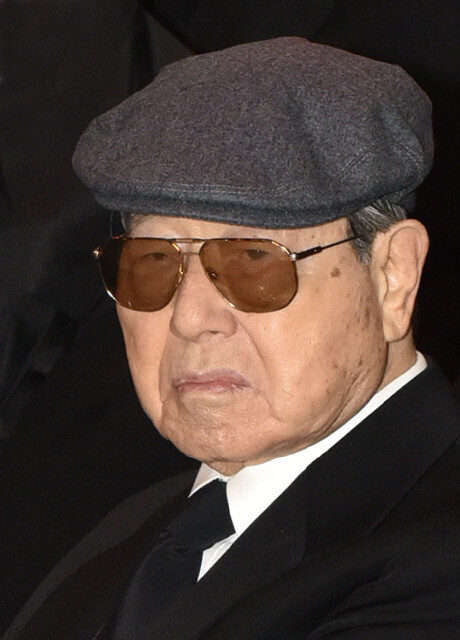hankyoreh
Links to other country sites 다른 나라 사이트 링크
NIS founder recommends stripping anti-communist investigation power

The founder of the predecessor to today’s National Intelligence Service (NIS) called for the abolishment of its authority to conduct anti-communist investigations.
Kim Jong-pil, a former Prime Minister and founder of the Korean Central Intelligence Agency (KCIA), told the Joong-Ang Ilbo newspaper in an interview on Apr. 3 that the “reason the NIS interferes in politics is because it holds investigative authority.”
“All we need to do is assign anti-communist investigation authority to the prosecutors and let [the NIS] focus on the basic duties of an intelligence agency,” he advised.
The authority in question is the NIS’s right to investigate crimes punishable according to the National Security Law, including so-called “left-wing crimes” such as espionage. The agency’s ability to investigate without any filter on its intelligence has triggered an outcry, with charges of human rights violations and political interference.
Kim, who founded the KCIA in 1961 and served as its first director, said its initial empowerment with investigative authority was intended as a “limited-time, special situation.”
“The decision to give the KCIA investigative authority was an exceptional, limited-time measure under a special set of circumstances aimed at protecting the ‘revolutionary government,’” he explained, referring to the military government that took power in a 1961 coup.
“Since the first official civilian administrations, there have been attempts to return investigative authority to the Ministry of Justice, but the KCIA has retained its powers,” Kim explained.
Kim criticized the actions of the NIS, noting that “some of the later directors have forgotten the KCIA’s basic duties and role.”
“They’ve also become targets of public censure and resentment with the way they’ve taken advantage of the political situation to overstep or abuse their authority,” he noted.
“Even now, they hold on to investigative powers and refuse to let them go. As founder of the KCIA, I feel responsible,” he continued.
Kim’s remarks were seen as a reference to ongoing political interference by numerous past KCIA/NIS directors, including organized interference by NIS agents in the 2012 presidential election under orders from then-director Won Sei-hoon. Ruling and opposition party politicians have long debated transferring the NIS’s investigative authority elsewhere, but discussions have failed to move forward due to strenuous objections from the ruling Saenuri Party (NFP).
So far, the ruling party has yet to produce a clear response to Kim’s remarks.
“The NIS’s investigative powers are a sensitive topic, so it’s tough to talk about them,” said one key party official on condition of anonymity.
“This wasn’t a politician saying that - it was a senior figure in society,” the official noted.
Kim Gwang-lim, the Saenuri chairman of the National Assembly Intelligence Committee, said he had “no comment.”
The Blue House said it would be “inappropriate for the Blue House to comment on remarks by a veteran statesman.”
By Choi Hye-jeong, staff reporter
Please direct questions or comments to [english@hani.co.kr]

Editorial・opinion
![[Column] Has Korea, too, crossed the Rubicon on China? [Column] Has Korea, too, crossed the Rubicon on China?](https://flexible.img.hani.co.kr/flexible/normal/500/300/imgdb/original/2024/0419/9317135153409185.jpg) [Column] Has Korea, too, crossed the Rubicon on China?
[Column] Has Korea, too, crossed the Rubicon on China?![[Correspondent’s column] In Japan’s alliance with US, echoes of its past alliances with UK [Correspondent’s column] In Japan’s alliance with US, echoes of its past alliances with UK](https://flexible.img.hani.co.kr/flexible/normal/500/300/imgdb/original/2024/0419/2317135166563519.jpg) [Correspondent’s column] In Japan’s alliance with US, echoes of its past alliances with UK
[Correspondent’s column] In Japan’s alliance with US, echoes of its past alliances with UK- [Editorial] Does Yoon think the Korean public is wrong?
- [Editorial] As it bolsters its alliance with US, Japan must be accountable for past
- [Guest essay] Amending the Constitution is Yoon’s key to leaving office in public’s good graces
- [Editorial] 10 years on, lessons of Sewol tragedy must never be forgotten
- [Column] A death blow to Korea’s prosecutor politics
- [Correspondent’s column] The US and the end of Japanese pacifism
- [Guest essay] How Korea turned its trainee doctors into monsters
- [Guest essay] As someone who helped forge Seoul-Moscow ties, their status today troubles me
Most viewed articles
- 1[Column] The clock is ticking for Korea’s first lady
- 2Samsung barricades office as unionized workers strike for better conditions
- 3[Correspondent’s column] In Japan’s alliance with US, echoes of its past alliances with UK
- 4After 2 months of delayed, denied medical care, Koreans worry worst may be yet to come
- 5[Column] Has Korea, too, crossed the Rubicon on China?
- 6Hong Se-hwa, voice for tolerance whose memoir of exile touched a chord, dies at 76
- 7US overtakes China as Korea’s top export market, prompting trade sanction jitters
- 8All eyes on Xiaomi after it pulls off EV that Apple couldn’t
- 9[Photo] Smile ambassador, you’re on camera
- 10[News analysis] After elections, prosecutorial reform will likely make legislative agenda